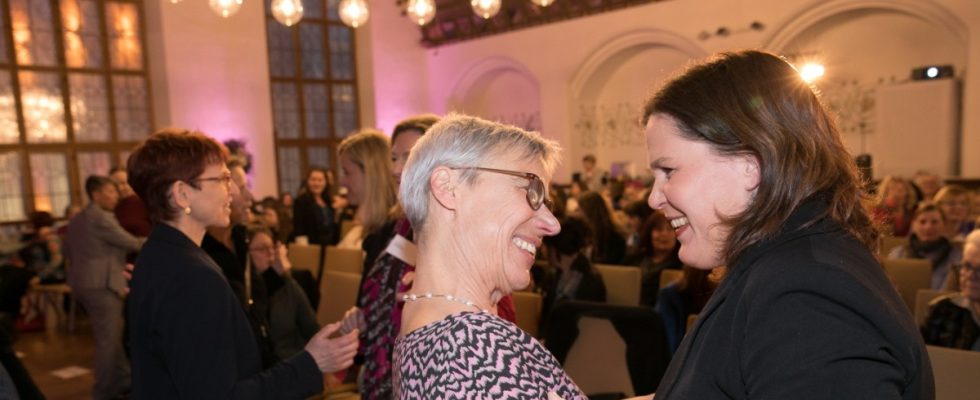The evening begins with a hug. Mayor Verena Dietl (SPD) holds award winner Lydia Dietrich in her arms for a long moment before the award ceremony of the Anita Augspurg Prize begins on Tuesday evening. The non-profit Frauen*hilfe Munich is being honored for its work for women and against violence for 45 years. There are three opulent bouquets of flowers on the stage in the hall of the Old Town Hall. Arrangements in wild berry color. The rows of chairs in front of the stage are almost completely occupied, and around 380 guests accepted the invitation. Most are women.
The city has been awarding the prize since 1994, which has been endowed with 10,000 euros since 2019 and is named after a Munich woman. As a pioneer of feminism, Anita Augspurg embodied values in the 19th century that women’s rights activists continue to advocate for today. But even today there is loud a study by the World Bank No country in the world gives women the same opportunities as men. Not even in the wealthiest countries. According to the Bavarian State Office for Statistics, women in Germany earned an average of 18 percent less than men last year. In Bavaria it is even 21 percent. “A tragedy,” says SPD city councilor Micky Wenngatz.
“Highlight of the year”
Equality is a human right and is anchored in the Basic Law, says Wenngatz. The SPD politician heads the city’s commission on equality and, as part of the jury, selected Frauen*hilfe München as the winner. The ceremony was the personal “highlight of the year” for the 63-year-old. Because many energetic and committed women would come together that evening. She looks through the rows of seats and says: “That beats every Oscar night.”
In her speech, Wenngatz spoke of the women in Iran and Afghanistan, of those who were raped and murdered by Hamas. “In Munich, women’s lives are different. They can choose which school they attend, manage their own money, even choose not to get married or have children.” But even in Germany, statistically, a man tries to kill a woman every day, warns Wenngatz. “Every third day a woman dies from violence. This is not a family drama, but murder. This is femicide.”
“When we started, I thought that in ten years we wouldn’t need women’s shelters anymore.”
Many of the women in the audience belong to women’s rights organizations themselves. “When we started, I thought that in ten years we would no longer need women’s shelters,” says Marianne Breithaupt. The 77-year-old worked for Frauen*hilfe until the end of the 1990s. “But it’s still bad. The violence isn’t getting worse. Violent criminals keep coming.” At her time, Munich had the largest women’s shelter in Germany, but even at that time the demand was greater than the capacity. And something happened that still brings tears to Breithaupt’s eyes today. “Two women were found dead back then. I kept saying: Nobody dies in my case.”
At the end, Verena Dietl tries to summarize the whole evening: “Unfortunately I have to dampen the happy mood here, today may be an awards ceremony, but it is also a sign of what is still going wrong in our society.” That evening, hugs are exchanged, beetroot hummus snacks are eaten, and fruit salad is spooned out of bowls. Perhaps the mood is so happy and pleasant because you can feel that everyone agrees on one thing: the still great inequality. There is still so much to do.
Anyone who experiences violence in a relationship can Women’s Aid Munich You can reach us around the clock on 089 35 48 30.

